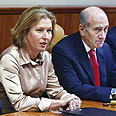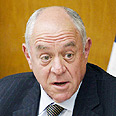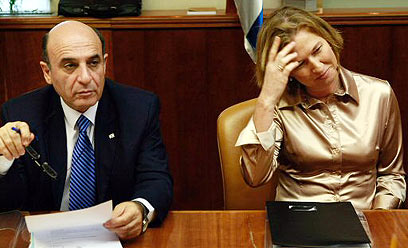


Government approves 2009 State Budget
Following more than 16 hours of discussion, prime minister and finance minister manage to convince opposing ministers from Kadima and Pensioners Party to support budget proposal. Thirteen ministers vote in favor of Treasury proposal, 12 vote against it and Vice Premier Haim Ramon abstains
Can PM breathe with relief? The government on Sunday night approved the 2009 State Budget by a bare majority. Following a marathonic debate of more than 16 hours, 13 ministers voted in favor of the budget proposal, 12 opposed it and Vice Premier Haim Ramon abstained.
The 13 supporting ministers were the members of Kadima – excluding Transportation Minister Shaul Mofaz – and the Pensioners Party. Mofaz and the Labor and Shas ministers voted against the Treasury proposal.
The vote followed many arguments and meetings into the night. The vote was scheduled to take place at 11 pm, but until the last moment it appeared that Prime Minister Ehud Olmert and Finance Minister Ronnie Bar-On would find it difficult to gain a majority to support the budget, after Mofaz managed to enlist additional opposers.
At the end of the vote Olmert announced, "We managed to convey stability."
The prime ministerwent on to say, "I was determined to pass this budget. It was much easier for me not to pass the budget and let my successors deal with it."
He added that "the responsibility towards the market and this government's heritage overpowered any political and governmental consideration."

For and against. Livni (R) and Mofaz at cabinet meeting (Photo: AFP)
Shas chairman, Minister Eli Yishai, said that the approval of the 2009 State Budget "perpetuates the trend of crushing the weak."
According to Yishai, "There is no doubt that this is an imaginary budget which will turn into a dead signal in any alternative coalition. Unfortunately, the government approved a virtual budget. Without renewed thinking, the government will become virtual as well."
When the ministers convened to vote on the budget, Labor Chairman and Defense Minister Ehud Barak tried to postpone the vote by one week.
"It’s very late. How are we expected to vote now after what happened with last month's cuts?" he asked. But the prime minister attacked him, saying, "Had you bothered to sit all day at the cabinet meeting, Mr. Defense Minister, you might be able to understand what is going on at this hour."
Olmert refused to talk to Barak before the vote. Barak, who realized that he had lost the majority against the budget, asked to talk to Olmert, but the prime minister told Cabinet Secretary Oved Yehezkel, "I don't work for him."
During the long day of discussions, the prime minister clarified that after the vote he would fire ministers who would continue to oppose the clauses agreed on.
The prime minister slammed the Labor chairman, accusing him of hiding information and lying to his ministers by not informing them that he had received a promise on the transfer of billions of shekels in accordance with the Brodet Committee's recommendations on the security budget.
Aides to Olmert accused Barak of "political manipulative" conduct, aimed at hindering the approval of the budget. Senior officials at the Prime Minister's Office said following the vote, "This is a great political loss for Barak, who gambled on everything and believed he would drag Ministers Mofaz, Dichter and Avraham-Balila along."
Pensioners: Great achievements
The prime minister summoned three of Kadima's ministers – Ze'ev Boim, Ruhama Avraham-Blaila and Avi Dichter – to his office, in a bid to convince them to support the budget proposal. Simultaneously, Treasury officials pressured the Pensioners ministers.
Olmert and Bar-On accepted a significant part of the rebellious ministers' demands. Internal Security Minister Dichter was convinced by the allocation of additional funds to the Israel Police, and his office stated that most of his demands were answered.
Before the vote on the budget, the finance minister learned that the prime minister had agreed to additional compromises in his discussions with the rebellious ministers, whose offices received hundreds of millions of shekels.
"I can't meet such agreements, we are talking about hundreds of millions of shekels," Bar-On complained to Olmert. "Things cannot be settled in notes to the prime minister. The prime minister is being deceived. No one asked me."
Olmert replied that "due to shortage of time, we did not manage to discuss everything in detail."
The Pensioners Party boasted about its "wonderful achievements." Minister Rafi Eitan said, "There has never been a party, including the social parties, which has managed to achieve what we achieved for our public tonight. And no one has fought for the pensioners' rights as we are doing as ministers inside the coalition."
Even after the budget approval, a very long process is expected before the proposal is adopted by the Knesset before the end of the year. The prime minister may choose to fire ministers who will oppose the budget, including Shas and Labor members, and the budget format may change after the primary elections in Kadima. Both Mofaz and Foreign Minister Tzipi Livni have stated that they would make changes to the 2009 budget if elected.















